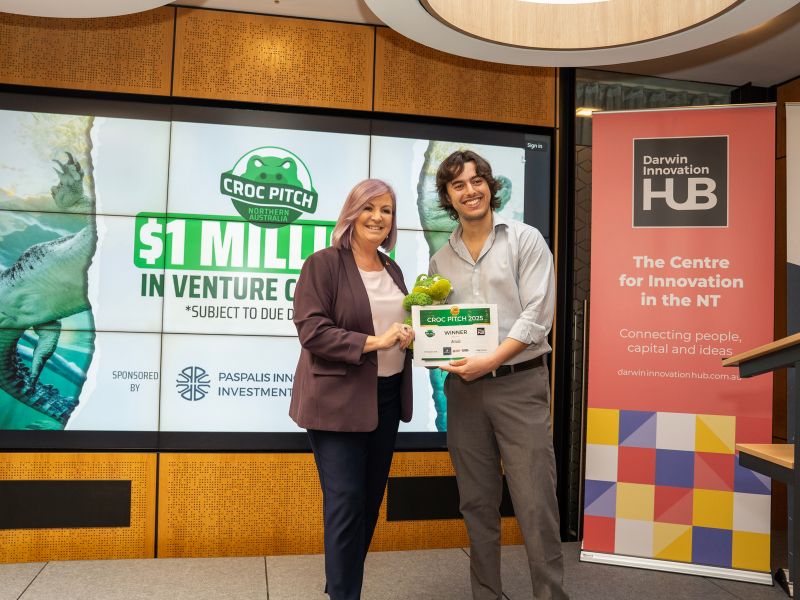Sydney-based space-tech startup Arlula has won Croc Pitch 2025, securing up to $1 million from Paspalis Capital and cementing Northern Australia as a proving ground for frontier technology.
The company’s flagship platform, Geostack, transforms how satellite and drone imagery is accessed and delivered.
Instead of waiting days for data, Geostack orchestrates multiple satellite operators to provide near real-time images – a capability with major implications for defence, disaster response, mining and environmental monitoring.
“It’s been a whirlwind,” said Arlula co-founder and chief executive, Sebastian Chaoui. “We took Croc Pitch really seriously, and the win couldn’t have come at a better time. We’re in the middle of a funding round and having Paspalis come on as a lead investor gives us huge momentum.”

For Mr Chaoui, Northern Australia is a natural home for the company’s technology. With five million square kilometres of maritime territory – almost the size of the entire Australian continent – the surveillance challenge is immense.
“Illegal fishing, untracked economic activity, border security – these are massive challenges. Planes and patrol boats simply can’t cover that territory. Satellites can, but historically it’s been too slow and too manual,” he said.
“Our innovation is about coordination: orchestrating satellites in a way that gets decision-makers the right data in minutes, not days.”
The Croc Pitch competition brought together key stakeholders including the Northern Territory government, Defence representatives and major industry players, opening doors to direct engagement with these attendees and potential customers across Southeast Asia.
“Darwin is closer to Singapore than to Sydney, so it creates a natural connection to the region,” Mr Chaoui said. “Thanks to Croc Pitch, we’re now talking with investors and customers in Southeast Asia as well as here in Australia.”
Arlula’s platform is being applied to some of the most difficult monitoring challenges. In maritime surveillance, Mr Chaoui explains, “patrolling waters is like looking for a needle in a haystack… With responsive satellites, you can instantly see if it’s a fishing boat, a tanker, or just a canoe – without risking lives or sending out million-dollar aircraft unnecessarily.”
The same technology can be applied in mining, where tailings dam failures can cause catastrophic damage. “If you can coordinate sensors, drones and satellites to monitor those sites in real time, you save time, you save money and you protect lives,” he said.
The company is already working with major partners including NTT Data and the Japanese government. Using Northern Australia as a testbed for its maritime intelligence platform, Arlula is refining technology that can then be exported globally.
“There aren’t many places in the world that are both remote enough to stress-test our technology and safe enough to do business in. That’s what makes the NT unique. We’re planning to hire engineers in Darwin and open an office there, so we can work alongside end-users and export the learnings worldwide,” Mr Chaoui said.
“Paspalis really helped me understand how the NT could play a role in Arlula’s growth, and how our technology could support local communities as well as global customers.”
For the founder, the Croc Pitch win is the latest milestone in a long journey. At 22, Mr Chaoui founded Cuberider, which ran Australia’s first mission on the International Space Station with NASA. That experience, he explained, shaped his ambition for Arlula.
“I saw how wasteful the space industry could be – billion-dollar satellites underused, with little benefit for the wider community. We wanted to see how software could unlock greater utilisation of these exquisite sensors and assets in orbit. That’s where Arlula began,” he said.
With co-founder Arran Salerno and chief technology officer Scott Owens, the company set out to build software that could solve what Mr Chaoui calls “the orchestration problem” – ensuring the right satellites, drones and sensors are in the right place at the right time.
“We don’t own satellites, we don’t sell data, and we don’t do analytics. We coordinate. That’s what makes the difference,” he said.
Arlula is now closing its funding round with Paspalis as lead investor and preparing to scale. While defence and intelligence remain its strongest market, Mr Chaoui is determined to broaden the impact.
“Our mission is to connect people on Earth with technology in space – not just for defence, but for industries like mining, insurance, agriculture and emergency services. We want to show how space technology can build resilience for communities around the world,” he said.
He also has a message for policymakers and investors. “Australia has a chance to lead in certain types of space technology. If government became a customer of companies like Arlula, Esper and others, we could move the needle on how this country manages its resources and strengthens national resilience.”
This article was produced by InnovationAus.com in partnership with Paspalis.
Do you know more? Contact James Riley via Email.
